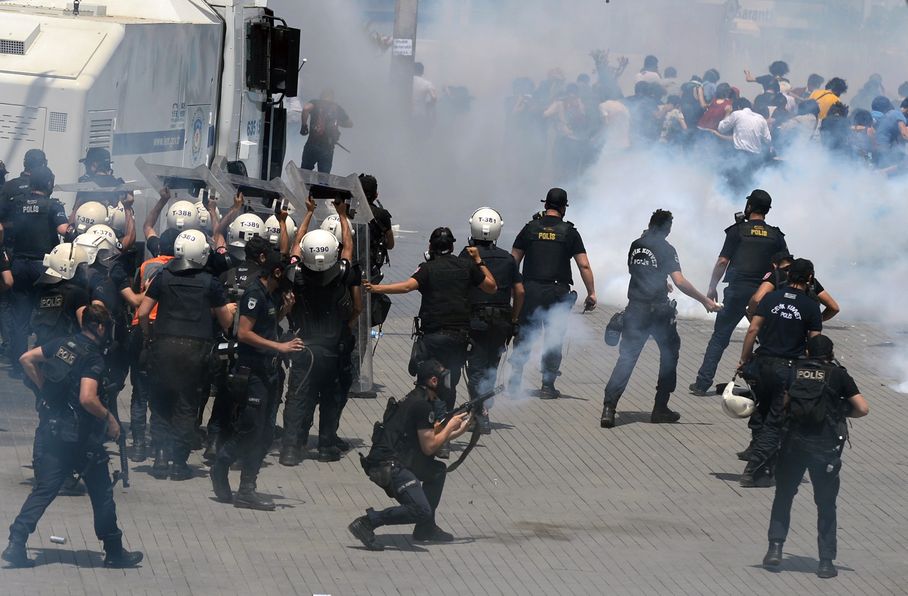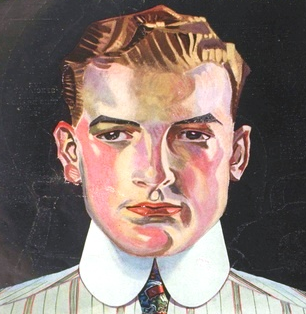What began on May 28th as a small demonstration has quickly mushroomed into a nationwide protest against the oppressive tactics used by Erdogan's AKP government to suppress dissent. On Tuesday, concerned citizens gathered in Gezi Park near Istanbul’s famous Taksim Square in an attempt to prevent the destruction of valuable green space for yet another shopping mall. Police attacked the protesters with pepper spray and water cannons, a tactic which backfired and has led to larger, more determined protests every day since.
Hundreds of people have been injured in the clashes, including reporters. Several have sustained injuries serious enough to require emergency surgery, and there are unconfirmed reports of two deaths. The protests have now spread to other major cities including Ankara, Bursa, Izmir and Adana.
Protesters in Gezi Park kept up their vigil through the night. On Friday morning at 5:00 am, police with pepper spray and teargas dispersed the crowd, but by Friday afternoon the protest had swollen to over 4,000 and more showed up for a rally at 7:00 pm. The protests keep moving around the square and along Istiklal Avenue as police drive them from one location to another. While most people have tried to conduct a sit-in protest, some have resorted to throwing rocks at the police.
Amnesty International has condemned the government’s excessive use of force. “The use of violence by police on this scale appears designed to deny the right to peaceful protest altogether and to discourage others from taking part,” said John Dalhuisen, Director of Europe and Central Asia Programme at Amnesty International. “The use of tear gas against peaceful protestors and in confined spaces where it may constitute a serious danger to health is unacceptable, breaches international human rights standards and must be stopped immediately.”
Observers with Amnesty International were also beaten with batons and tear-gassed. The organization is calling on the Turkish government to launch an investigation of abuses.
Istanbul’s Urban Sprawl
The city of Istanbul has, for decades, grown at an alarming rate, as people searching for work have left the undeveloped countryside and sought employment in industrial centers concentrated around the Sea of Marmara. Unrest and fighting in the Kurdish areas of eastern Anatolia have also contributed to the urban sprawl.
Istanbul’s population of 14 million has very limited options when it comes to natural recreation. There are very few parks and green areas open to the public as the vast majority are military zones, palace gardens, historical sites and cemeteries. The green space per capita is among the lowest in Europe at only 6.5 square meters per person. Compare this with Amsterdam (45.5 square meters), Rome (45.3 square meters), Stockholm (87.5 square meters), New York (29 square meters) or London (27 square meters), and it is easy to understand why the residents of the city are upset.
It's About Humanity Not Trees
Although it was clearly the love of nature that started these peaceful protests, support has been generated by public sympathy for the victims of police brutality. Pictures of protesters being gassed and sprayed quickly went viral, provoking outrage among the public at large. Many people have tweeted the event live, bringing the protests into living rooms and offices throughout Turkey and the world.
One of these was Akin Unver, who tweeted:
“Police is the only one disturbing peace and creating violence here. Crowd is great.”
“One gas canister lands right into the german consulate in gumussuyu right before my eyes.”
“Counted 48 gas canister fires in 1 minute! This is extreme brutality #occupyistanbul #occupygezi.”
Some, like Erkan Saka, were quick to point out the similarity between oppression in Syria and what the current Turkish regime is doing.
“Those who terrorize their own people in the middle of the city are supposed to bring democracy to Syria if you can swallow that.”
Others railed on the lack of coverage by mainstream Turkish media. Selim Siyami Sümer tweeted to a list of Turkish TV stations, “Just so you know, you are all history now. @haberturk, @ntv, @cnnturkcom, @Skyturk360, @startv, @atvcomtr, @kanalD”
Early reports of fatalities, still unconfirmed, were also announced via Twitter by TurkeyEmergency. “The 16 year-old girl that has died as a result of a riot tank running her over will become a symbol of this revolt #occupygezi”
Live feeds were also available. While we watched, police fired 37 teargas canisters at the crowd in approximately one minute, stopping only when it looked like the street was enveloped in fog.
AKP Risks Popularity
Erdogan’s AKP government holds a majority of the seats in Parliament, but the latest protests have caused some AKP supporters to question their loyalty. Hayrullah Öztürk had a teargas canister lobbed through the window of his car as he was driving by. He said, "I voted for the AKP, but the way things are going is not good. It is not good to be such a know-it-all."
The Istanbul Chamber of Physicians also issued a statement calling for restraint,
"It is the duty of the Governor of Istanbul and the Istanbul Chief of Police to protect the lives and property of the conscientious people of Istanbul who are trying to make their voices heard so that Gezi Park is not destroyed. It is not their job to protect the profitability of the contractors who will build a shopping mall on Taksim Square."
This was a thinly-veiled reference to widespread corruption involving billions of dollars uncovered within the Public Housing Authority (TOKI).
The Chamber’s statement also said,
“We can find no reason, conscience, or logic in the attacks of May 31, 2013 at 5:00 am on the Istanbul Chamber of Physicians first-aid tent using teargas canisters and water cannons. If this is the political stance of the AKP government, then to hell with your policies.”
The Chamber called for the resignation of those responsible.
Turkish Spring?
There can be little doubt that the energy and passion displayed by protestors over the last few days is not driven primarily by the specter of losing a few trees. Public anger may simmer for years before it boils over in outrage. The Arab Spring that swept through the Middle East and brought down governments in Libya, Egypt and Tunisia, started when a Tunisian street vendor named Mohamed Biouazizi set himself on fire, but was really the result of years of injustice suffered by the people.
In Turkey, dissatisfaction with the Islamist-leaning AKP has also been building for quite some time. Recent developments, such as restrictions placed on alcohol sales, which is widely viewed as "creeping sharia" by secularists, have turned up the heat on the public pressure cooker. Will it be enough to blow the lid on the AKP? Public outrage is an unpredictable phenomenon. The AKP would do well to remember this. People can get in a spring-cleaning frenzy when the dirt becomes more than they can bear.
Hundreds of people have been injured in the clashes, including reporters. Several have sustained injuries serious enough to require emergency surgery, and there are unconfirmed reports of two deaths. The protests have now spread to other major cities including Ankara, Bursa, Izmir and Adana.
Protesters in Gezi Park kept up their vigil through the night. On Friday morning at 5:00 am, police with pepper spray and teargas dispersed the crowd, but by Friday afternoon the protest had swollen to over 4,000 and more showed up for a rally at 7:00 pm. The protests keep moving around the square and along Istiklal Avenue as police drive them from one location to another. While most people have tried to conduct a sit-in protest, some have resorted to throwing rocks at the police.
Amnesty International has condemned the government’s excessive use of force. “The use of violence by police on this scale appears designed to deny the right to peaceful protest altogether and to discourage others from taking part,” said John Dalhuisen, Director of Europe and Central Asia Programme at Amnesty International. “The use of tear gas against peaceful protestors and in confined spaces where it may constitute a serious danger to health is unacceptable, breaches international human rights standards and must be stopped immediately.”
Observers with Amnesty International were also beaten with batons and tear-gassed. The organization is calling on the Turkish government to launch an investigation of abuses.
Istanbul’s Urban Sprawl
The city of Istanbul has, for decades, grown at an alarming rate, as people searching for work have left the undeveloped countryside and sought employment in industrial centers concentrated around the Sea of Marmara. Unrest and fighting in the Kurdish areas of eastern Anatolia have also contributed to the urban sprawl.
Istanbul’s population of 14 million has very limited options when it comes to natural recreation. There are very few parks and green areas open to the public as the vast majority are military zones, palace gardens, historical sites and cemeteries. The green space per capita is among the lowest in Europe at only 6.5 square meters per person. Compare this with Amsterdam (45.5 square meters), Rome (45.3 square meters), Stockholm (87.5 square meters), New York (29 square meters) or London (27 square meters), and it is easy to understand why the residents of the city are upset.
It's About Humanity Not Trees
Although it was clearly the love of nature that started these peaceful protests, support has been generated by public sympathy for the victims of police brutality. Pictures of protesters being gassed and sprayed quickly went viral, provoking outrage among the public at large. Many people have tweeted the event live, bringing the protests into living rooms and offices throughout Turkey and the world.
One of these was Akin Unver, who tweeted:
“Police is the only one disturbing peace and creating violence here. Crowd is great.”
“One gas canister lands right into the german consulate in gumussuyu right before my eyes.”
“Counted 48 gas canister fires in 1 minute! This is extreme brutality #occupyistanbul #occupygezi.”
Some, like Erkan Saka, were quick to point out the similarity between oppression in Syria and what the current Turkish regime is doing.
“Those who terrorize their own people in the middle of the city are supposed to bring democracy to Syria if you can swallow that.”
Others railed on the lack of coverage by mainstream Turkish media. Selim Siyami Sümer tweeted to a list of Turkish TV stations, “Just so you know, you are all history now. @haberturk, @ntv, @cnnturkcom, @Skyturk360, @startv, @atvcomtr, @kanalD”
Early reports of fatalities, still unconfirmed, were also announced via Twitter by TurkeyEmergency. “The 16 year-old girl that has died as a result of a riot tank running her over will become a symbol of this revolt #occupygezi”
Live feeds were also available. While we watched, police fired 37 teargas canisters at the crowd in approximately one minute, stopping only when it looked like the street was enveloped in fog.
AKP Risks Popularity
Erdogan’s AKP government holds a majority of the seats in Parliament, but the latest protests have caused some AKP supporters to question their loyalty. Hayrullah Öztürk had a teargas canister lobbed through the window of his car as he was driving by. He said, "I voted for the AKP, but the way things are going is not good. It is not good to be such a know-it-all."
The Istanbul Chamber of Physicians also issued a statement calling for restraint,
"It is the duty of the Governor of Istanbul and the Istanbul Chief of Police to protect the lives and property of the conscientious people of Istanbul who are trying to make their voices heard so that Gezi Park is not destroyed. It is not their job to protect the profitability of the contractors who will build a shopping mall on Taksim Square."
This was a thinly-veiled reference to widespread corruption involving billions of dollars uncovered within the Public Housing Authority (TOKI).
The Chamber’s statement also said,
“We can find no reason, conscience, or logic in the attacks of May 31, 2013 at 5:00 am on the Istanbul Chamber of Physicians first-aid tent using teargas canisters and water cannons. If this is the political stance of the AKP government, then to hell with your policies.”
The Chamber called for the resignation of those responsible.
Turkish Spring?
There can be little doubt that the energy and passion displayed by protestors over the last few days is not driven primarily by the specter of losing a few trees. Public anger may simmer for years before it boils over in outrage. The Arab Spring that swept through the Middle East and brought down governments in Libya, Egypt and Tunisia, started when a Tunisian street vendor named Mohamed Biouazizi set himself on fire, but was really the result of years of injustice suffered by the people.
In Turkey, dissatisfaction with the Islamist-leaning AKP has also been building for quite some time. Recent developments, such as restrictions placed on alcohol sales, which is widely viewed as "creeping sharia" by secularists, have turned up the heat on the public pressure cooker. Will it be enough to blow the lid on the AKP? Public outrage is an unpredictable phenomenon. The AKP would do well to remember this. People can get in a spring-cleaning frenzy when the dirt becomes more than they can bear.

 RSS Feed
RSS Feed

